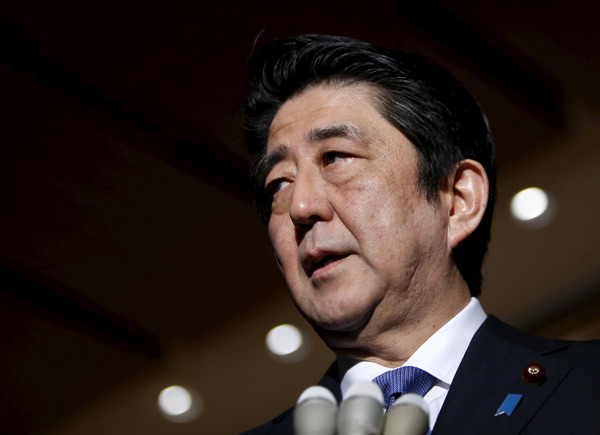Japan's economy still moribund despite Abenomics
Updated: 2016-07-04 07:48
By Cai Hong(China Daily)
|
|||||||||
 |
|
Japan's Prime Minister Shinzo Abe speaks to reporters at Abe's official residence in Tokyo, Japan, January 28, 2016. [Photo/Agencies] |
Data released in Tokyo last week paint a grim picture of Japan's economy and population.
Statistics released by Bank of Japan on Friday showed that household spending dipped for the third straight month in May, and core consumer prices suffered their greatest annual drop since 2013.
Household spending figures are a key indicator of private consumption, which accounts for about 60 percent of Japan's gross domestic product.
In June, Japanese Prime Minister Shinzo Abe announced the delay of a planned consumption tax hike by two and a half years until October 2019, with the aim of boosting private spending in the country.
Also on Friday, the BOJ's quarterly Tankan survey found that Japanese manufacturers' confidence edged down in June, while the service sector's sentiment fell from three months ago as a result of the poor consumption.
Such data point to the fragility of Japan's economy, which remains moribund despite Abe and the central bank resorting to measures such as expanding fiscal spending and adopting a negative interest rate policy.
The anxiety and uncertainty sparked by the United Kingdom's vote to leave the European Union has sent the Japanese yen shooting up in value, adding more challenges to the Japanese economy. The reversal of the yen's fall since the beginning of this year has clouded the economy's prospects, pushing down share prices in Tokyo.
Meanwhile, the results of the 2015 census released by Japan's Ministry of Internal Affairs and Communications on Wednesday shows that the number of people above 65 now exceeds, for the first time, that of children under 14. In other words, more than 1 in 4 people, or a record 26.7 percent of Japan's overall population, were aged 65 or older as of Oct. 1. Japan's National Institute of Population and Social Security expects that people aged 65 or older will account for 31.5 percent of the country's population by 2030.
The number of people aged 14 and below stood at 15.86 million, 12.7 percent of the total population, a record low.
The census also found that women and senior people aged 65 or older, for the first time, accounted for more than 50 percent of Japan's workforce. And the labor force shrank from 63.69 million in 2010 to 60.75 million in 2015 due to low birth rate and a rapidly aging population.
Japan has the highest proportion of older adults in the world. Aging is not only an immediate personal issue but also a salient factor in crucial public policies, such as pensions and healthcare. The shrinking working-age population and increasing number of older nonworking adults hamper economic expansion and challenge the pension system.
Some economists claim that deflation risk from an aging population is not inevitable because ambitious structural reforms and an aggressive monetary policy reaction can provide the offset.
But structural reforms, the third and the most important arrow of the Abenomics, are thin on the ground.
Some of Japan's department stores started their summer promotion on Friday, several days earlier than they did last year in the hope of shoring up sales.
But it may not matter much when wages and household income are stagnant.
The author is China Daily Tokyo bureau chief. caihong@chinadaily.com.cn
Related Stories
Abenomics suffers crippling blow 2016-04-07 08:22
Abenomics is not faring as well as hoped 2016-03-14 08:07
Japan's protest aimed at helping Abe revise pacifist Constitution 2016-06-16 07:55
Thousands of anti-Abe protesters rally in Tokyo as election nears 2016-06-06 11:29
Abe's blame game reveals his policies failing to get results 2016-06-06 08:02
Abe may leave tax hike to new PM 2016-05-30 07:13
Today's Top News
China-UK ties to remain strong despite Brexit: envoy
Gove denies treachery as he pitches to be next PM
Theresa May among British PM hopefuls
Boris Johnson quits party leadership contest
UK parties head for leadership battles
Terrorist attack in Turkey reinforces need for unity
New British PM to be in place by Sept 9
Labour's Jeremy Corbyn loeses no-confidence vote
Hot Topics
Lunar probe , China growth forecasts, Emission rules get tougher, China seen through 'colored lens', International board,
Editor's Picks

|

|

|

|

|

|







